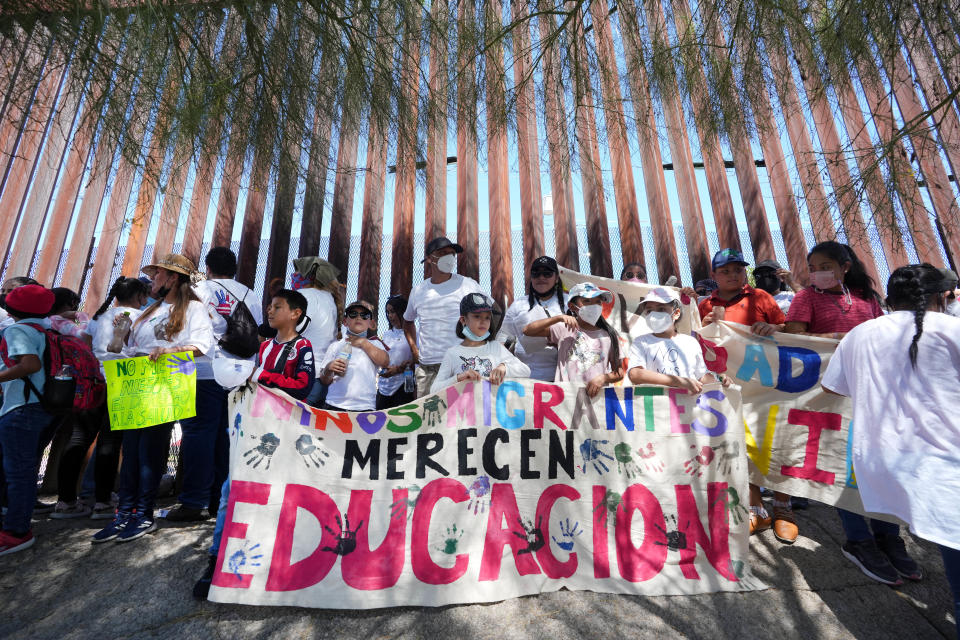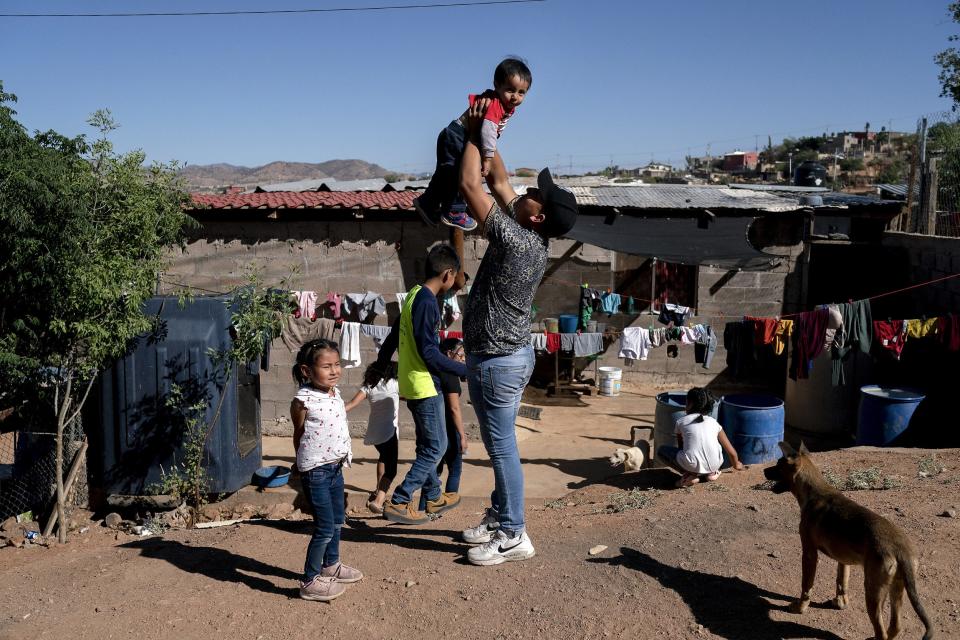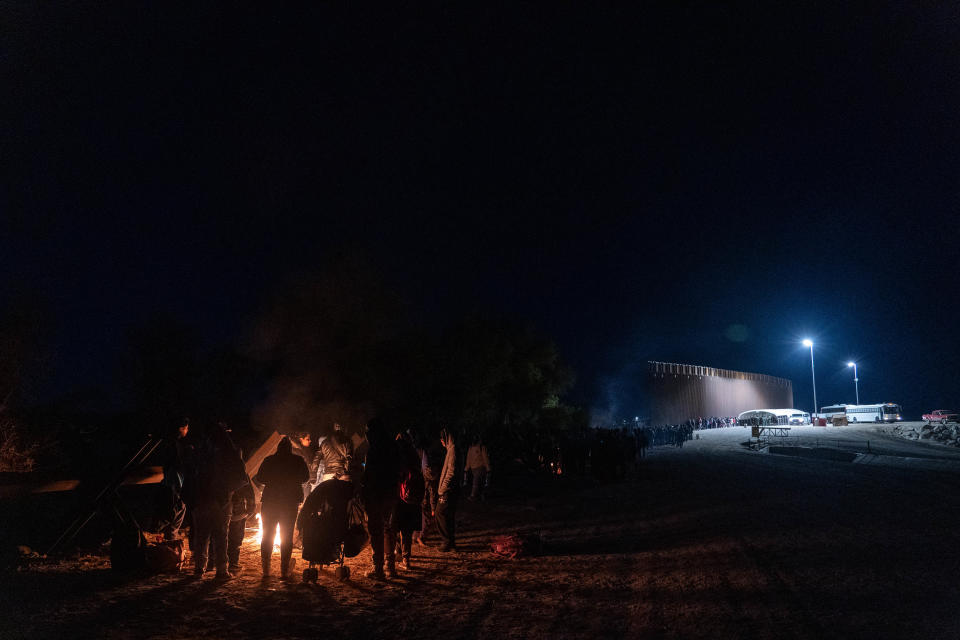Pima County, Tucson grapple with increase in migrants as Title 42 remains
For the last several weeks, a higher number of asylum seekers have arrived at Tucson shelters while the city also continued to receive migrants from El Paso, Texas — even as the nation's top court ruled the pandemic-era border policy known as Title 42 will remain in place.
The U.S. Supreme Court voted Tuesday to keep Title 42 in place for now, following a request from 19 Republican-led states, after the law was set to expire. Title 42 is a public health law that allows border agents to expel asylum-seeking migrants swiftly at the border. Advocates argue that asylum seekers have a legal right to seek asylum.
Since the beginning of December, El Paso has seen thousands of asylum seekers come through the city as they flee from violence, according to Aljazeera in an article published Dec. 12. The city recorded an average of 900 people per day passing through its facilities and those of nonprofit organizations.
Pima County Communications Director Mark Evans said the county has seen between 400 and 500 migrants arrive per day for the last several weeks, many from El Paso, reaching the limit of what its current resources can handle.
The county contracts with nonprofit Catholic Services of Southern Arizona and local hotels to house asylum seekers as they wait for their flights out of the city to be united with their sponsors, typically friends and family members.
Evans said officials at southwestern border entry points send asylum seekers to different cities or towns when increased crossings mean resources are stretched thin.
At a Tuesday meeting of the Pima County Board of Supervisors, the county voted to lease a building in south Tucson to house migrants. Located near South Calle Santa Cruz and West Drexel Road, the office space will be turned into a shelter for asylum seekers and replace the need for hotels. Funding for the shelter came from the Federal Emergency Management Agency.
More migrants in Tucson viewed as ‘unseen crisis’

Evans said although recent media attention has made the increase in migrants more visible, the city has dealt with increasing numbers since 2019, calling the situation an “unseen crisis” until now.
Pima County and Tucson have helped process and house higher numbers of migrants for four years after the interfaith nonprofit Catholic Community Services of Southern Arizona reached out to local officials for help when their resources were spread thin by an increasing number of asylum seekers arriving daily.
“If it hadn’t been for this response, mostly from the interfaith community in Tucson, this would be a much more visible situation that has been going on now for four years,” Evans said.
Since 2019, the daily number of asylum seekers brought to Tucson has ranged from 20 to 100 per day, building up to a level the county is seeing now of around 400 per day.
“We have the infrastructure in place to deal with that and we have been able to be quite successful to secure federal funding to pay for it all,” Evans said.
Related: Days before Christmas, migrants fleeing poverty and danger find shelter at a Mesa church
The county contracts with Catholic Community Services of Southern Arizona who runs the Casa Alitas Welcome Center, a shelter in an unused wing of the Pima County Juvenile Detention Center.
At Casa Alitas, volunteers provide asylum seekers with COVID-19 tests, food, clothing, and help buying bus, train and plane tickets to unite with sponsors who will support them while they await an asylum court hearing. Migrants may spend up to 12 to 48 hours at the shelter, or slightly longer if needed, while waiting for their departure time.
Evans said Pima County spends $400,000 per week in its effort to help asylum seekers. Last year, the county secured $28 million to provide them with resources. This year, it's looking to secure more federal funding to continue this effort into spring.

These resources include contracts with hotels to house migrants while they wait for flights out of Tucson, as well as contracts with transportation companies for short haul transit from shelters to bus stations or airports, as well as taxi services to take people to medical appointments if necessary.
Evans said helping migrants remains a priority for humanitarian reasons as well as public health and safety.
“The worst that can happen is we have hundreds of people who are standing in the street in Tucson with limited resources, without anybody to them find a place to lay their head that night, to help them navigate a new country and new customs to try to figure out … how to get to where they are going,” he said.
Related: Migrant encounters climb in Tucson sector, fall in Yuma as border restrictions continue
Policies create urgent situation at the border
Chelsea Sachau is an attorney with the Florence Project, a nonprofit that provides free legal and social services to adults and unaccompanied children in immigration custody in Arizona.
She said the implementation of Title 42 and previous restrictive border policies — including the Remain in Mexico policy and metering — have created refugee camps at the border where people are at the mercy of organized crime, inclement weather, and a lack of basic necessities.
“My clients in Nogales are worried,” Sachau said, about her clients at the border.
Beyond the one meal a day she said her clients receive from humanitarian organizations, they are left without knowing how to feed their kids, and if they will survive the frigid Sonoran desert temperatures without blankets and other basic necessities.

“This is directly a result of this policy,” Sachau said, noting that the end of Title 42 is “not opening the borders, it’s not reimaging border policy. It’s just going back to what it was pre-pandemic.”
While Title 42 is a law meant to quarantine people and animals that could potentially bring diseases into the country, Sachau critiqued the law as being used by the U.S. to shut out asylum seekers “under the guise of public health when there have been other means such as testing for COVID-19.”
She reiterated U.S. immigration policy recognizes people have a right to seek asylum if they are being persecuted, no matter how they enter the country.
Sachau: Clients are fleeing for their lives
Commonly, people flee from their homes in fear of criminal organizations that try to recruit their young men and boys to work for them and threaten to kill them or their family members, Sachau said.
She recalled the story of a client who was in a desperate situation at the beginning of Title 42, when advocates had no opportunity to request that urgent vulnerable cases be considered for exemptions.
Related: Release of migrants onto the streets of Yuma County averted, for now
The client was a woman who was pregnant from a sexual assault and had been kidnapped by criminal organizations in Mexico, Sachau said.
She escaped and tried to seek medical help but could not find anyone to help her.
Sachau said outside Hermosillo, in Mexico, many medical resources are under resourced or understaffed. She has also heard from clients that clinics often discriminate against them.
In desperation, the woman decided to “enter without inspection” and cross the desert into the U.S. to find help, Sachau said.
Sachau said when Border Patrol found the woman, they took her to a hospital in the U.S. Although the woman was in active labor, because she hadn’t given birth yet, they expelled her back to Mexico.
The Florence Project found the woman with the help of humanitarian organizations and took her to a hospital. Due to the stress, the baby almost died, Sachau said.
Because of the extreme conditions the woman faced, Florence Project was able to advocate for the woman and her baby to seek asylum in the U.S. and join her friends and family while awaiting her legal proceedings.
Sachau highlighted the sad reality that, while this story sounds like an outlier, it is actually a common occurrence.
“They flee with the clothes on their back and their kids with them,” Sachau said.
Sachau explained that she has known people as young as two years old who were torture victims, teens who were torture victims, as well as clients who were sexually assaulted due to their sexual orientation, all because they were displaced.
Most people Sachau sees in these situations have sponsors, or family and friends, willing to take them in and make sure they get to their court hearings, she reiterated.
Sachau noted Title 42 also is strengthening organized crime as asylum seekers, waiting at the border to have their due process, are preyed upon by these groups.
“There are far more humane and cost-effective options on the table that our politicians and our government entities are not utilizing,” Sachau said. “It’s costly to run title 42.”
This article originally appeared on Arizona Republic: Pima County, Tucson grapple with increase in migrants as Title 42 remains

